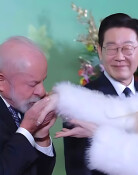Crisis Rumors Pose Major Threat to Economy
Crisis Rumors Pose Major Threat to Economy
Posted September. 03, 2008 09:39,
Rumors have spread that Korea will face an economic crisis this month, including many that experts say are groundless.
Nonetheless, the Korean economy is suffering from the rumors in addition to economic uncertainties such as the global business slowdown.
Most experts as well as the government have ruled out another financial crisis like the one in 1997. Instead they warn that the rapid spread of groundless rumors is negatively impacting the economy, with the government busier fighting groundless rumors instead of the real problems.
Reports say Korea will face a liquidity crisis if it is forced to repay all short-term debt maturing this month. At a news conference yesterday, an official of the Strategy and Finance Ministry said, The government has already secured the money to repay the debt. It doesnt need to issue more bonds.
Debt set to mature this month is around 19 trillion won (16.7 billion U.S. dollars). The government said that since only seven trillion won (6.1 billion U.S. dollars) of the debt is held by foreign investors, it can repay the debt with its reserves.
In a forum at the National Assembly yesterday, Bank of Korea Governor Lee Seong-tae also ruled out a financial crisis, saying, The rumors are really groundless. Korea has gone through considerable fluctuations in foreign exchange rates and stock prices, but that does not mean the economy will go under.
Global financial institutions also support Seoul`s stance. Bloomberg quoted Moody`s Vice President Thomas Byrne as saying, Korea wont face a repeat of the 1997 currency collapse. He also said the outlook for the nations "A2" long-term credit rating is stable (The "A2" rating is given to a nation with stable credit).
The British financial group HSBC also called exaggerated a Times of London report predicting a "black September" for Korea.
The rumors, however, are partially based on facts. The Korean financial market is fluctuating, with the won-dollar exchange rate rising to 1,134 yesterday. Worse, the benchmark stock index KOSPI fell below 1,500 in closing at 1,407. The trade deficit is expected to reach 10 billion dollars by the end of the year.
Inefficient government action has made matters worse. The government injected more than 10 billion dollars into the foreign exchange market to prevent the won from depreciating sharply, all in vain. Investors also lost their confidence in the government, which suddenly prioritized containing inflation over stabilizing the foreign exchange rate.
The exaggerated rumors, however, could do more damage. Main opposition Democratic Party member Kang Bong-kyun, who was presidential secretary for economic affairs when the Korean economy teetered on the verge of collapse 11 years ago, said, Koreas financial market has become inflexible due to uncertainties in the stock market, interest rate and foreign exchange. It will not, however, have another crisis.
Even a sound corporation can go under if it suffers from false rumors of imminent collapse. Experts unanimously say swift and effective countermeasures are needed to deal with the rapidly spreading rumors.
Shin Min-yeong of LG Economic Research Institute said, Korea is unlikely to be forced to repay the debt all at once. But the government needs to identify and resolve potential uncertainty to prevent domestic problems such as sluggish profitability of certain savings banks and smaller companies, combined with international issues such as the U.S. credit crunch, from generating a real crisis.







